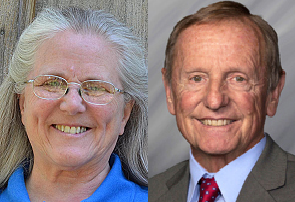The District 18 Indiana House of Representatives race between a 30-year legislative incumbent and a progressive farmer from the southeast corner of Kosciusko County offer voters one of the more stark choices they’ll find on the ballot Tuesday.
“There are certain things government has to do, but I want them to do it in the most efficient, cost effective way possible. I think I have good common sense and I attempt to apply that to that concept,” he said.
His opposition to regulations led to his role on a government reduction committee. “We’ve gotten rid of a lot of different committees that have been making regulations and so forth and I’m very proud of that,” Wolkins said.
The differences between the two are endless – from school vouchers to the notion of establishing a $15 minimum wage to the call for hate crimes legislation.
Moore opposes school vouchers because she said it takes aware from public school funding and that rural residents don’t have the same choices for alternative private schools as more populated communities.
Wolkins supports the idea of school choice.
Moore supports legislation to establish hate crimes legislation in Indiana. Wolkins said he opposes the idea of protecting special classes of people.
He’s been a longtime member of the House environmental committee, where he said that he’s supported legislation that makes sense.
Moore contends he’s been no friend of the environment and points to Wolkins’ voting record on confined animal feeding operations, commonly known as CAFOs.
Moore, 66, and her husband, Stan, run a family farm and she is strongly opposed to the way Indiana permits CAFOs to operate.
She feels large animal operations are a threat to the water supply and the state needs to more strictly regulate them.
Wolkins said large operations are necessary and that environmentalists’ efforts are too extreme.
He said he supports the idea of stricter rules on application of manure, though.
Moore supports state-wide pre-kindergarten programing. Wolkins said the state can’t afford it.
Moore claims Wolkins talks a good talk, but has failed to take action on an assortment of issues, including opioids and gerrymandering.
“He said he doesn’t believe in gerrymandering but he’s been in there for 30 years. Wasn’t that long enough to do something?” she asked.
Moore was critical of how Indiana Attorney General Curtis Hill approached the opioid crisis two years ago by taking an aggressive criminal approach.
She said the addiction problem should be viewed as a health issue.
“The biggest mental health institution in our country should not be our jails and it is because we’ve just ignored mental health,” she said.
Possibly the closest thing they agree on is the legalization of medical marijuana, but they also have differences on that as well.
Wolkins said he’s warmed up to the idea of legalizing medical marijuana because support for it appears to be growing among his constituents who have filled out surveys.
Wolkins said he may well support medical marijuana in the upcoming General Assembly, but only if lawmakers can find a way to keep pot away from those who prefer to use it recreationally.
He said he’s unaware of any states who have been able to limit its use in that way and said access to medical marijuana, if approved, should be determined individually by medical specialists.
Moore supports medical marijuana, but would like to see it kept out of the hands of big companies. She said she thinks individuals should be able to grow it for personal use if they have a medical condition that warrants it.
“I don’t want to see medical marijuana turned into something that is owned by the drug companies and then you have to pay something you can’t afford,” Moore said. “It might not be the same or as good as, but you should be able to grow your own if you have a prescription for it.”
Wolkins strongly opposes legalizing marijuana for recreational use. Moore said she could support it, but worries it could impair motorists and wants to see evidence that it does not.
Wolkins, 75, has had some health issues in the past, but said he’s received a clean bill of health recently. If elected, he said he’s not committing to making this his final term.
He has a list of legislative items he wants to work on if elected.
Those include revisions to policies under the Bureau of Motor Vehicles that were enacted in 2016. He’d also like to see changes in state eminent domain policy to further protect homeowners.
Broadly speaking, Wolkins said he believes the state needs to address state funding to local jails, which are housing inmates for the state.
He also thinks the state needs to adjust the spending formula for schools to make sure more state money goes toward schools for classroom eduction.





